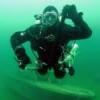
Is there such a thing as TOO MUCH training?
#1

Posted 13 October 2005 - 01:52 PM
Contact me directly at Kamala@SingleDivers.com for your private or group travel needs or 864-557-6079 AND don't miss SD's 2018-2021 Trips! ....here! Most are once in a lifetime opportunities...don't miss the chance to go!!
SD LEGACY/OLD/MANUAL Forms & Documents.... here !
Click here TO PAY for Merchandise, Membership, or Travel
"Imitation is the sincerest flattery." - Gandhi
"Imitation is proof that originality is rare." - ScubaHawk
SingleDivers.com...often imitated...never duplicated!
Kamala Shadduck c/o SingleDivers.com LLC
2234 North Federal Hwy, #1010 Boca Raton, FL 33431
formerly...
710 Dive Buddy Lane; Salem, SC 29676
864-557-6079 tel/celfone/office or tollfree fax 888-480-0906
#2

Posted 13 October 2005 - 05:02 PM
That's a good question, Kamala. There can never be too much GOOD or EXCELLENT training. That's why all the best instructors still have instructors. For beginning divers or new students, I think the two best questions to ask an instructor would be, "How long have you been diving/teaching?" and "Do you have an instructor yourself?" If that instructor does or is seeking one from whom to learn, then you may be off to a good start by taking courses from that instructor. I know so many course directors and instructor trainers who think they are the last word when it comes to diving knowledge. They've stopped growing. Instructors like these may be teaching behind the times and could teach a diver every known and unknown specialty for years to come and may never match the knowledge that student could gain in two courses with the right instructor.Is there such a thing as too much training? Or is the risk merely collecting too many c-cards more for the sake of the card and not for the knowledge gained that the card represents?
As they say, garbage in, garbage out. I think it's important for divers to train beyond the level at which they will be diving and for instructors to train far beyond the level at which they'll be teaching. For some divers, structured learning, i.e., classes may continue for life, for others, they may decide to stop taking courses at some point, but should always keep their "book knowledge" up to date by reading magazines, buying updated manuals and using the internet. For both groups, constant practice and refinement of skills is necessary to maintain them.
Nothing makes a a diver more sloppy and less prepared for emergencies like diving does, and nothing makes one more prepared for emergencies like constant training and practice do.
Trace
Technical Training Director
PDIC International
#3

Posted 13 October 2005 - 06:06 PM
Okay, I've never been able to pass up an opportunity to stick my foot in my mouth, so here goes...Is there such a thing as too much training? Or is the risk merely collecting too many c-cards more for the sake of the card and not for the knowledge gained that the card represents?
First, I am a newly certified diver. PADI Open Water, and in fact I'm so newly certified, PADI hasn't sent me my permanent c-card yet (I still have 30 days on the PIC card, though). I'm not by any means an expert, true; I have, however, spent a lot of time perusing SCUBA-related boards that are populated by a seemingly inordinate number of technical divers and fairly advanced rec divers. I have come to a couple of conclusions, one based on my experience with the PADI certification process and one based on my observations of other boards. First, the personal experience one (pulling on flame-proof suit now):
The training is not as important as the trainee: more specifically, the trainee's attitude toward the training and his/her dilligence in adhering to that training. What I mean by that is this: diving, like many other sports, has a number of inherent risks that a diver must assume, simply by descending below the surface of the water while breathing air from a pressurized cylinder. That assumption of risk is a personal choice, and a personal responsibility, an individual responsibility. Certifying agencies can only go so far in preparing a person to accept and effectively manage those risks, mainly by establishing *minimum* safety standards and ensuring that those being certified have been exposed to those standards. Written tests, file copies of independent-study knowledge reviews, and practical skills evaluations by qualified instructors are how the agencies accomplish that. Once the agency is satisfied, it's entirely up to the diver to remember their training and use it effectively to avoid killing themselves or their buddies while chasing the underwater wildlife.
Incidentally, the PADI certification process is not unlike the process used by state and national agencies to certify emergency medical technicians (I used to be one myself, years ago). There's a specific period of study, hands-on training, and evaluation, followed by practical experience in a real-world environment, culminating in written and practical skills evaluations by qualified certifiers. The military uses a similar concept for advanced training beyond Basic Military Training. Of course, EMT's and the military also have formal mentoring processes that help newbies make the transition from being certified to being proficient; recreational diving lacks that advantage. The onus is on the new diver to develop their knowledge however they can manage to do that. So, the short version is that training is only effective if it's used, and that has nothing whatsoever to do with how much documentation a diver has, and everything to do with how that diver conducts themselves in the water.
The second conclusion:
Different agencies establish standards for different flavors of diving. We've all seen the discussions (or flame wars, whatever description suits you) over the merits of one agency over another. In truth, it's difficult to compare certifying agencies, because in nearly every case the agency was formed to cater to a specific segment of the diving community that wasn't being well served at the time. Even when general categories of certification overlap (i.e. the various agencies that conduct "open water" certification), it's difficult to compare one to another, since the organizations that conduct both technical and recreational training have differing philosphies on certification (or more specifically the skills necessary to be considered certified) than agencies who cater mainly to recreational divers. And here's the kicker: neither approach is wrong. They both will produce safe divers, as well as those whom none of us would want to be within a nautical mile of. It all comes down, again, to the individual diver and their dedication to preserving life and limb by staying within their training, or seeking additional training to develop skills. Is it possible to have too much training in the context of a single agency? Probably; at some point, you're going to reach a point of diminishing returns where the skills you pick up in training are less valuable than the ones you'd pick up and hone naturally by just diving. Experience counts. When you get to the point where you're paying an instructor to watch you demonstrate skills you've already developed on your own, you've probably reached the point where you have too much training.
Another side of the original question ("Is there such a thing as too much training?", for those of you who have lost the though along the way) is actually a second question: how do you define "too much training"? Does that mean that every dive you log is with an instructor, and you never do any dives just for the heck of it or to exercise skills you've learned previously? That would be *my* idea of too much training, as in "too much training, not enough play". Or is "too much" indicated by someone's obsession with every single detail, ney, the minutae of diving, to the exclusion of all else (including the original point: to have fun)? Don't get me wrong, I'm a big believer in procedures, checklists, and doing things the same way every time (it's an old habit beaten into me by the USAF, I'll admit, but it does seem to work), but c'mon! At some point the checklists are done and it's time to light the fires, kick the tires, and first one up is the leader. Let 'er rip and have a ball, dude! (Or dudette, if you prefer...
Okay, enough ranting. Dive Safe, Dive Happy, and Dive Often!
Cheers!
Jim
Every man has fear. Any man who has no fear belongs in an institution. Or in Special Forces.
#4

Posted 13 October 2005 - 06:24 PM
Thanks
Jeff
#5

Posted 13 October 2005 - 07:00 PM
Dude, just take my classes. Problem solved.Having said that and since the thread is about training.. may I suggest maybe a training forum where Instructors may list themselves and courses they teach? I know I would rather pay $$ to someone I'm familiar with rather than say a resort.
Trace
Technical Training Director
PDIC International
#6

Posted 13 October 2005 - 07:10 PM
I would if I knew where/what you offered...I would opted for something in NC.. I'm comfy with low/no viz conditions.. in fact I hope to dive the Copper River in SC with a friend who I met thru my sister that was the assistant 17 years ago to the guy who certified me 3 years ago..He tried to get me to cert. then when I was lifeguarding and I would have except for that fact I didnt know anyone other than him and was saving money for college..wow flashback there..sorryDude, just take my classes. Problem solved.Having said that and since the thread is about training.. may I suggest maybe a training forum where Instructors may list themselves and courses they teach? I know I would rather pay $$ to someone I'm familiar with rather than say a resort.

Trace
So back to the thread..you've help me prove my suggestion. even in jest.
#7

Posted 14 October 2005 - 07:18 AM
the organizations that conduct both technical and recreational training have differing philosphies on certification (or more specifically the skills necessary to be considered certified) than agencies who cater mainly to recreational divers. And here's the kicker: neither approach is wrong. They both will produce safe divers, as well as those whom none of us would want to be within a nautical mile of.
I know I'll probably catch hell for this, but Jim, I find it interesting that you would be willing to express an opinion that differing philosophies of training are equally valid after first telling us you don't have enough experience diving to have seen if it were true or not.
First, I am a newly certified diver. PADI Open Water, and in fact I'm so newly certified, PADI hasn't sent me my permanent c-card yet
In truth, it's difficult to compare certifying agencies, because in nearly every case the agency was formed to cater to a specific segment of the diving community that wasn't being well served at the time.
What gives you that idea? It's simply not true. LA County was the first agency, but being local, they do have a limited target. YMCA was the next agency and with a national approach, they did fit your description. After that, very few agencies fit your idea. NAUI, PADI and the other agencies that came later targeted the exact same segement of the diving community that was already being served. As divers started cave diving there was another segment that was not being served. Agencies certifiying cave divers again fit your description. There have been a few since, but for the most part, that has not been the case.
It's difficult to compare agencies not because they serve different segments of the diving community, but for several other reasons. 1. Most agencies don't want you to know what their standards are. They are secret and only available to Instructors, AIs & DMs of the particular agency. 2. If you are able to get copies of standards, some agencies have written them in such a manner that they are confusing. I've seen experienced instructors from the same agency disagree over exactly what their agency's standards require and what they forbid. 3. Different agencies use different terms to refer to the same skill/concept. 4. Standards for different agencies are written in different formats.
Having said that, it is still possible to compare agency standards. There are big differences from one agency to another. In my opinion, those differences are usually directly reflected in the quality of the courses.
diving, like many other sports, has a number of inherent risks that a diver must assume, simply by descending below the surface of the water while breathing air from a pressurized cylinder. That assumption of risk is a personal choice, and a personal responsibility, an individual responsibility.
Great point!
Is there such a thing as too much training? Or is the risk merely collecting too many c-cards more for the sake of the card and not for the knowledge gained that the card represents?
Surprise! I have an opinion on this. No. There is no such thing as too much training. There is poor training and any poor training is too much. There is also a frequent problem of too little training. Another common problem is divers training all the time and never getting real life experience on their own. You gain some experience diving with your instructor, but you gain much more diving on your own. Experience is as important as formal training. You should almost always stop training and dive to gain experience between classes. This is most important between OW and Advanced.
As for collecting cards, it's not important one way or the other. I have one or two myself, the cards are usually meaningless. The important question is are you learning from the classes you're taking? If you are, it doesn't matter if you were motivated by a desire to get another card or to expand your knowledge.
DSSW,
WWW™
#8

Posted 14 October 2005 - 07:30 AM
I learn something on every single dive. I have taken a few extra classes since my OW in 1988. I don't dive enough and haven't since I was first certified. When I move back to Florida and semi-retire, I intend to dive a lot more. I suspect that I will take some more classes then. By the way, I already have my instructor picked out. Until then I've been thinking about taking some DAN courses. Mostly for safety reasons and so I will know what to do if an emergency occurs, not just do what I think is right.
Dennis
"Suppose you were an idiot ... And suppose you were a member of Congress ... But I repeat myself." --Mark Twain
#9

Posted 14 October 2005 - 08:09 AM
Too many classes without actual "dive time"? Yes. I have dove with gentleman who is now an instructor. He has never dove outside of taking a class or teaching one. This guy is a pain underwater and borderline dangerous. But, he has all of the cards, just nearly no practical experience in real life diving.
On the other hand, I have dove with many OW certified divers that have far more common sense and the difference is that they have been out there diving, having fun and learning.
That brings up another point. When you do your diving, if you aren't learning new lessons and applying them then having a ton of dives doesn't mean much either. Experience is only valuable if it applied and learned from itself.
Many of the people that I dive with would like you to be trained, but none of them will ask to see the C-card to dive trimix off their boat. They just know by dealing with you wether or not they want you on their boat. If they think that you are dangerous, showing them a plastic card will still not get you on their boat.
#10

Posted 14 October 2005 - 09:06 AM
Is there such a thing as too much training? Or is the risk merely collecting too many c-cards more for the sake of the card and not for the knowledge gained that the card represents?
The more cards, the merrier... at least until you reach 52. Then you can play a good hand of cards with them.
I have met a number of divers with more certifications than I have (just 2) and I wouldn't want them as my buddies. I have also met buddies with fewer certifications who I am happy to dive with.
The key: how are they in the water? I can't tell that from their cards. Only by diving with them. I once had to dive with a PADI instructor who had come down to Belize as my replacement once my tour was over. She was the absolute worst diver I have ever been in the water with. I had to tell the home office that they were risking some real liability by keeping her and stayed an extra two weeks on the ship until they were able to get a real replacement.
As Walter pointed out, L. A. County (my initial certifying agency after 7-8 years of diving) was the first in the States. It still gives some of the best training available, but is regional in nature. I have had many international dive ops require a check out dive because they didn't recognize the card issued in 1969.
I finally got a PADI card in Australia a few years ago. Everyone seems to recognize this card and no longer question me. I was fortunate in that the PADI instructor I took AOW with was very familiar with my LAC card (called it a museum piece) and also gave very good instruction (although the course was not as rigorous as my origional OW cert).
In the water experience is a great way to learn. It can't be gained to any real degree by adding new certs, especially when you can progress from OW to Rescue in so few dives. Of course even if you do 1,000 dives and keep making the same mistakes (that is not learning from them), you are not really improving your skills.
Edited by drbill, 14 October 2005 - 09:09 AM.
#11

Posted 14 October 2005 - 09:17 AM
the organizations that conduct both technical and recreational training have differing philosphies on certification (or more specifically the skills necessary to be considered certified) than agencies who cater mainly to recreational divers. And here's the kicker: neither approach is wrong. They both will produce safe divers, as well as those whom none of us would want to be within a nautical mile of.
I know I'll probably catch hell for this, but Jim, I find it interesting that you would be willing to express an opinion that differing philosophies of training are equally valid after first telling us you don't have enough experience diving to have seen if it were true or not.First, I am a newly certified diver. PADI Open Water, and in fact I'm so newly certified, PADI hasn't sent me my permanent c-card yet
In truth, it's difficult to compare certifying agencies, because in nearly every case the agency was formed to cater to a specific segment of the diving community that wasn't being well served at the time.
What gives you that idea? It's simply not true. LA County was the first agency, but being local, they do have a limited target. YMCA was the next agency and with a national approach, they did fit your description. After that, very few agencies fit your idea. NAUI, PADI and the other agencies that came later targeted the exact same segement of the diving community that was already being served. As divers started cave diving there was another segment that was not being served. Agencies certifiying cave divers again fit your description. There have been a few since, but for the most part, that has not been the case.
It's difficult to compare agencies not because they serve different segments of the diving community, but for several other reasons. 1. Most agencies don't want you to know what their standards are. They are secret and only available to Instructors, AIs & DMs of the particular agency. 2. If you are able to get copies of standards, some agencies have written them in such a manner that they are confusing. I've seen experienced instructors from the same agency disagree over exactly what their agency's standards require and what they forbid. 3. Different agencies use different terms to refer to the same skill/concept. 4. Standards for different agencies are written in different formats.
Having said that, it is still possible to compare agency standards. There are big differences from one agency to another. In my opinion, those differences are usually directly reflected in the quality of the courses.diving, like many other sports, has a number of inherent risks that a diver must assume, simply by descending below the surface of the water while breathing air from a pressurized cylinder. That assumption of risk is a personal choice, and a personal responsibility, an individual responsibility.
Great point!Is there such a thing as too much training? Or is the risk merely collecting too many c-cards more for the sake of the card and not for the knowledge gained that the card represents?
Surprise! I have an opinion on this. No. There is no such thing as too much training. There is poor training and any poor training is too much. There is also a frequent problem of too little training. Another common problem is divers training all the time and never getting real life experience on their own. You gain some experience diving with your instructor, but you gain much more diving on your own. Experience is as important as formal training. You should almost always stop training and dive to gain experience between classes. This is most important between OW and Advanced.
As for collecting cards, it's not important one way or the other. I have one or two myself, the cards are usually meaningless. The important question is are you learning from the classes you're taking? If you are, it doesn't matter if you were motivated by a desire to get another card or to expand your knowledge.
Walter, I am slightly confused by you statement of "secret standards" If one does not know what the standard is how can you master it. Being new myself to to diving, I can't claim to know the in's and out's. but beingan instructor for Law Enforcement "Performance Objectives or Standards. must be spelled out so that they can be tested on. In the Open Watercourse I took with PADI. I list of "skills" to perform in order to complete that segment, or dive. The tests asked specific questions which required specific answers. I would have to state, thought that I did get the feeling that very few people actually "Fail" the course. I did have to re do some of the skills till I got it right. So I guess with this long winded statement, is "what does successfully completed" mean? The point to your secret standards
#12

Posted 14 October 2005 - 09:25 AM
This conversation is about ready to enter a realm that exceeds the scope of the question asked. While the discussion may continue, all participants must be careful how they discuss differing agency standards.
SD is an agency agnostic board and does not allow any agency bashing. Please be resprectful of that and do not make inflamitory statements nor well thought out ones that are impassioned in any belief that one agency is superior to another.
(While you may think that one agency is superior to another, any discussion about these beliefs will only lead to other impassioned members to defend thier agency and soon we will have agency bashing or the appearance of it.)
Thank you all for your respectful consideration in this matter. This thread will be monitored closely as any discussion of agency differences is a delicate subject.
Contact me directly at Kamala@SingleDivers.com for your private or group travel needs or 864-557-6079 AND don't miss SD's 2018-2021 Trips! ....here! Most are once in a lifetime opportunities...don't miss the chance to go!!
SD LEGACY/OLD/MANUAL Forms & Documents.... here !
Click here TO PAY for Merchandise, Membership, or Travel
"Imitation is the sincerest flattery." - Gandhi
"Imitation is proof that originality is rare." - ScubaHawk
SingleDivers.com...often imitated...never duplicated!
Kamala Shadduck c/o SingleDivers.com LLC
2234 North Federal Hwy, #1010 Boca Raton, FL 33431
formerly...
710 Dive Buddy Lane; Salem, SC 29676
864-557-6079 tel/celfone/office or tollfree fax 888-480-0906
#13

Posted 14 October 2005 - 09:29 AM
If one does not know what the standard is how can you master it.
It's fairly simple. You take a class. You read the book, watch the video, go over the CD, etc. During that process you learn material. If you learned it well enough, you can pass an exam on the material. You know what you learned, you know what you were tested on, but you don't know what the agency's standards required you to learn.
In the pool, you are presented with skills. You learn those skills to the satisfaction of the instructor. You are then tested on some of those skills in open water. If you've passed the exam and demonstrated the skills to the satisfaction of the instructor, you get a card. You have no idea if the instructor added extra skills not required by the agency or if he left out skills that are required. You don't know if he has a higher, lower or the same standard for passing skills as the agency. You know what you had to do in your class, not what the agency requires.
DSSW,
WWW™
#14

Posted 14 October 2005 - 09:41 AM
P.S. Wreck you started this........LOL...... Any way, in my opinion, I did not see any bashing ...yet. and I think the point being made here ( it's the individual instructors that make the difference, not their agencies)
Edited by ereediver, 14 October 2005 - 09:46 AM.
#15

Posted 14 October 2005 - 09:43 AM
DSSW,
WWW™
0 user(s) are reading this topic
0 members, 0 guests, 0 anonymous users



















